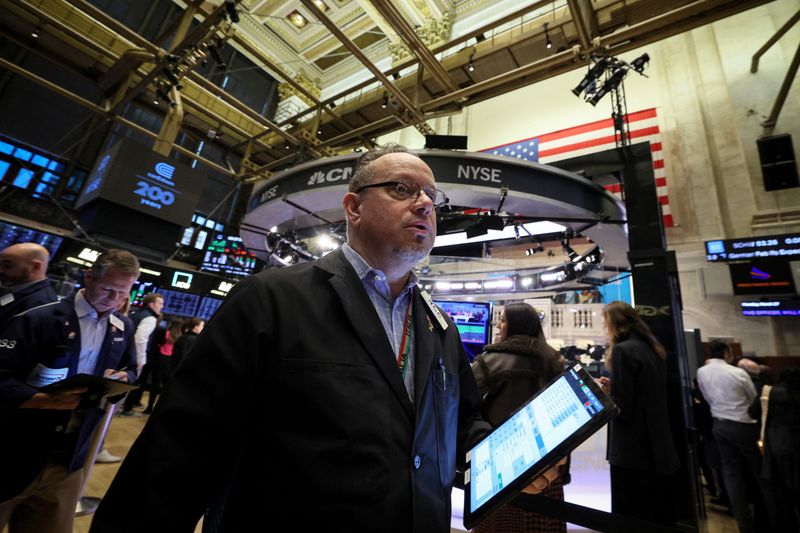
© Reuters. FILE PHOTO: Traders work on the floor of the New York Stock Exchange (NYSE) in New York City, U.S., March 27, 2023. REUTERS/Brendan McDermid
A look at the day ahead in U.S. and global markets from Mike Dolan
In like a lion, out like a lamb.
Farmers’ almanacs suggest a stormy and turbulent start to March means it’s likely to end calm and serene – and so it appears with world financial markets this year.
The surge in stock and bond volatility around this month’s banking shock in the United States and Europe appears to be petering out – and the financial tensions of the month also disguise what has still been a decent overall first quarter.
As regulators and central banks on both sides of the Atlantic learn the lessons and ponder remedial action to prevent any repeat or further contagion, the main question now is how deeply underlying economies have been disturbed.
The evidence is sketchy so far and the impact on lending and credit generally will be examined forensically from here.
Otherwise there’s little sign yet of a shock to a wider economy that, if anything, was picking up steam again this year just before March. Weekly U.S. jobless numbers will again gauge the labor market temperature later on Thursday as more Fed officials emerge to give their readout on the situation.
But while U.S. regional bank stock indices have clearly suffered a hit of about 20% from the March stress, the wider is on track to end the first quarter tomorrow some 5% higher. The tech-heavy, interest-rate sensitive NasdaqIXIC> is up 14%.
Stock volatility indices have returned to levels seen just as the Silicon Valley Bank problems first hit three weeks ago – more than two points lower than where they started the year.
That’s partly due to an assumption a brewing credit crunch will stop Federal Reserve interest rate rises in their tracks and see easing by year-end.
That U-turn in thinking during the month saw wild swings in the bond and rates markets, where key volatility gauges hit their highest since the 2008 crash. But even these seismographs are down by a quarter from mid-month peaks.
Futures markets remain undecided about whether there’s one more Fed rate hike left in May – but they remain confident easing will now come later in 2023.
Two-year Treasury yields which have now got a toehold back above 4% are settling about 25-30 basis points below where they started this year. The is about 1% lower so far this year.
So the rates horizon has fallen a bit once the noisy swings of the month are stripped out – but the economy, even though the bulk of March data has not arrived yet, continues to surprise more positively than at any point in almost a year.
Elsewhere, European markets continued to advance on Thursday, with banking stocks up another 2% and credit default swaps on many banks lower too. Even battered commercial real estate stocks, hit hard by the banking wobble, were recovering some ground.
March inflation numbers and business sentiment surveys are due across the continent.
H&M climbed 7.3% after the world’s second-biggest fashion retailer reported a surprise operating profit for the December-February period but warned that overall sales for the spring season had been delayed by cold weather.
Key developments that may provide direction to U.S. markets later on Thursday:
* U.S. weekly jobless claims, U.S. Q4 corporate profits, Q4 GDP revisions
* Boston Federal Reserve President Susan Collins, Minneapolis Fed President Neel Kashkari, Richmond Fed chief Thomas Barkin all speak
* Spanish Prime Minister Pedro Sanchez meets Chinese President Xi Jinping in Beijing
(Graphic: U.S. two-year Treasury yields plunge on banking stress –
(Graphic: 1Q23 EM currency performance versus USD –
(Graphic: An uptick in economic activity –
(Graphic: Distress in Europe’s real estate sector rises –
(By Mike Dolan, editing by XXXX mike.dolan@thomsonreuters.com. Twitter: @reutersMikeD)





